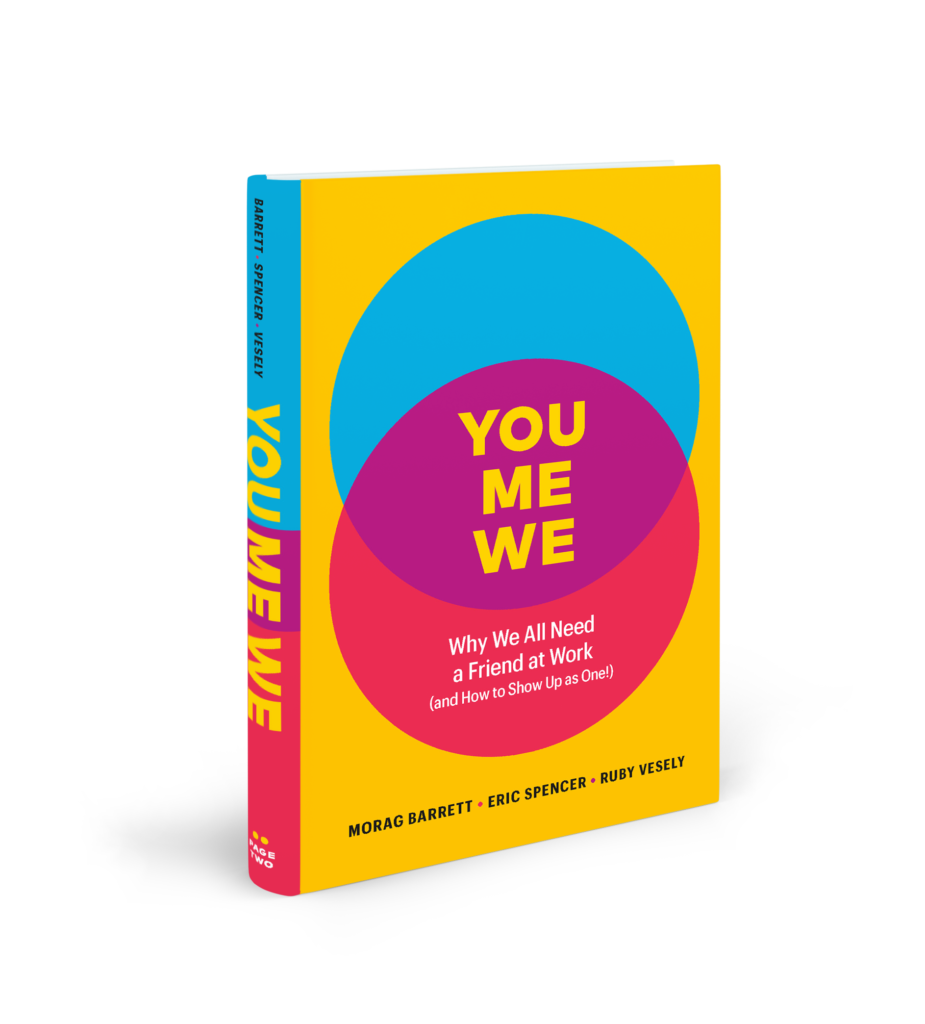Outline: The Stats | Why Workplace Friends? | The Ally Mindset | Takeaways From You, Me, We – Attitude – Connection and Compassion – Courage and Vulnerability – Candor and Debate | Final Thoughts
Can having a friend at work improve productivity and well-being? Indeed, we often find it challenging to build real, meaningful connections, especially with our co-workers or employees. “You, Me, We” tells us why we need to build real, lasting workplace connections for personal efficiency and organizational success.
The disconnect has worsened thanks to the COVID-19 pandemic, which isolated people from their workmates. This can impact efficiency since research demonstrates that lonely employees tend to feel less productive and unmotivated. Yet, most companies do not implement the idea of building proactive friendships at the workplace to improve morale and productivity.
You, Me, We is an effort by the authors Morag Barrett, Eric Spencer, and Ruby Vesely. It aims to offer useful insight into the need for building genuine, proactive connections at workplaces. And how transitioning from a ‘me-first’ mindset to a ‘we-first’ approach can drive success for the employees and businesses.
The Stats
A study conducted by Tom Rath, a former Gallup global practice leader, revealed that employees with at least three reliable friendships at work are about seven times more dedicated to their jobs. In addition to improving performance outcomes, having friends at the workplace will likely boost your life satisfaction by 96%. It also reduces the risk of the onset of health conditions like type 2 diabetes, hypertension, and Alzheimer’s disease.
Friendships are a smart business move. The ability to form deep connections with colleagues, bosses, clients, etc., vastly improves your work and work experience.
People who have close friends at work are seven times more likely to be engaged in their jobs, leading to less absenteeism (41%), higher productivity (17%), and greater profitability (21%).
“Having best friends at work will make you 96 percent more likely to be extremely satisfied with your life, cut in half your chance of dying of heart disease, accelerate your body’s ability to heal, and reduce the possibility that you’ll ever suffer from ill effects of Alzheimer’s disease, certain cancers, type 2 diabetes, and osteoporosis.”
Morag Barrett, Eric Spencer, and Ruby Vesely in You, Me, We.
Why Do We Need Friends at the Workplace?
Relationships are the true currency for success.
Morag Barrett, Eric Spencer, and Ruby Vesely in You, Me, We.
At the outset of the book, Morag suggests that workplace friendships are essential and “Relationships are the true currency for success.” While effective work relationships do wonders for business outcomes, a toxic workplace environment can heighten workplace stress and hamper project success.
Morag recollected the discomfort amidst the management at different organizations when Gallup released the Q12 employee engagement survey. One of the questions – Q10, which is also the core topic illustrated in You, Me, We – was, “Do you have a best friend at work?”
Gallup observed that employees who admit to having a close friend at work are likely to be more productive and driven. The data review also revealed that employees with real connections feel more supported by their peers and are more likely to appreciate a colleague’s performance.
What Is the Ally Mindset?
The Ally Mindset forms the core of You, Me, We. Developed by Morag in her previous book, Cultivate: The Power of Winning Relationships, the Ally Mindset determines how we present ourselves in the relationships that are most important to us. It makes the difference between being there for each other during tough times and undermining each other to compete for the spotlight.
The Ally Mindset relies on five practices:
- Abundance and generosity,
- Connection and compassion,
- Courage and vulnerability,
- Candor and debate,
- And action and accountability.
It banks on driving intentionality, suggesting that we must feel, think and perform in a way that ensures the health of the relationships and achieves the desired business results.
Major Takeaways From You, Me, We
This book aims to place the ideology “How do I show up in every situation as an ally” to the forefront for implementation at an organization, whether it’s for its leaders, executives, employees, and workmates.
Here are some principles that can help you implement the Ally Mindset in your professional relationships:
1. A Positive Attitude Towards Abundance Is Key to Success
Developing an abundance mindset requires you to believe that there are ample opportunities for everyone to succeed and that success isn’t scarce. It eliminates the need for toxic competition and allows free collaboration, thus creating success for everyone in the organization.
An abundance mindset helps pivot from a ‘me-first’ to a ‘we-first’ mind frame by enabling you to challenge your initial response to circumstances. When coupled with generosity, the abundance mindset enables leaders and employees to share their experiences and know-how with others. Consequently boosting the rate at which they achieve collective success.
2. Connection and Compassion Strengthen Your Professional Relations
Humans are hardwired to form connections – the neurons in our brains are stimulated when we interact with others. Interestingly, the Ally Mindset also relies on our innate desire to belong. Despite this intrinsic need, most of us often find it challenging to build genuine friendships at the workplace. However, recognizing, acknowledging, and supporting others go a long way toward strengthening relationships and driving better results for the organization.
A McKinsey survey revealed that although employees felt isolated during the COVID-19 pandemic, employee productivity and customer satisfaction increased simultaneously for companies that facilitated connections between colleagues. This enabled them to discuss and share ideas, network with peers and mentors, and support coworkers in achieving their goals. Thus, enabling proactive connections inspires workplace environments with less stress, more productive collaborations, improved morale, and greater resilience.
The authors also suggest that connection and compassion go hand in hand. Treating others with empathy and supporting them through their highs and lows helps strengthen relationships and results in greater success.
Interested in knowing how well you practice connection & compassion (and get some tips on how to improve)? Take the authors’ free Ally Mindset profile.
3. The Role of Courage and Vulnerability in Personal and Organizational Success
We often mistakenly regard vulnerability as a sign of weakness. However, upon introspection, it becomes evident that being vulnerable isn’t a shortcoming but requires immense character strength or courage. Demonstrating courage to admit mistakes and shortcomings and being open to sincere feedback is key to practicing the Ally Mindset.
More importantly, asking others for help is a sign of being a good leader. It inspires trust and gives rise to fresh ideas and productive collaborations. However, the inability of a leader to face their fears and handle criticism or feedback can stagnate a company’s growth.
Related Read: Learning the Skill of Asking for What You Want
4. Candor and Debate Are Crucial for Healthy Relationships at Work
The authors of You, Me, We assert that the success one achieves depends on the quality of their professional relationships at work. One parameter helpful in gauging a relationship’s quality is the degree of honesty and accountability. Being an ally requires you to express your perspectives and thoughts freely and to be open to offering and receiving tough feedback, albeit respectfully.
Exploring different possibilities to reach a viable solution for advancing business goals is also essential for building healthy, proactive friendships at the workplace. Implementing candor and debate can come in handy for effective conflict resolution and finding solutions for tricky business problems.
Related: Improve the Way You Communicate and be a Better Leader with Radical Candor
Final Thoughts: You, Me, We
The principles outlined in this book are efficient for leaders, employees, and coworkers in an informal or formal workplace. In a nutshell, “You, Me, We” aims to underline the need for you to show up as an ally first.
You can accomplish this by being mindful of how you wish others to feel in your company, setting the intention to be helpful, and doing your best to achieve milestones together.

Morag Barrett, CEO of SkyeTeam, is a sought out executive coach and member of the Marshall Goldsmith 100 Coaches organization. Eric Spencer is the COO of SkyeTeam and is passionate about developing high-performing leaders and teams. Ruby Vesely is a valued executive coach and facilitator. Together they are the heart of SkyeTeam an international leadership development firm, and the coauthors of You, Me, We. Why We All Need a Friend at Work (And How To Show Up as One!)
Additional resources:











